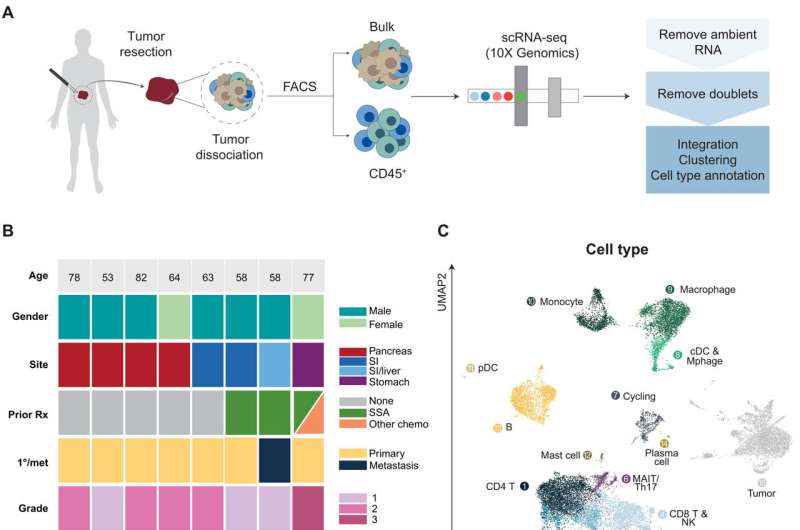This article has been reviewed according to Science X's editorial process and policies. Editors have highlighted the following attributes while ensuring the content's credibility:
fact-checked
peer-reviewed publication
trusted source
proofread
Study provides new look at why rare cancer often evades treatments

Researchers at Boston Medical Center and Dana-Farber Cancer Institute have conducted one of the first-ever analyses of neuroendocrine tumors (NETs) at single-cell resolution, unlocking new insights into this rare and often hard-to-treat cancer. The findings represent a tremendous leap forward in understanding why these tumors are largely resistant to immunotherapy and provide key insights that could lead to future treatments.
The full study was published today in Science Advances.
"This study was a tour-de-force that catalyzed the efforts and innovations of researchers across Boston—including Boston Medical Center and Dana-Farber Cancer Institute—and has resulted in a better understanding of the molecular drivers of these heterogeneous, difficult-to-treat tumors," said co-author Matthew Kulke, MD, chief of hematology/oncology at Boston Medical Center, Co-Director of the BU/BMC Cancer Center, and the Zoltan Kohn Professor at Boston University Chobanian & Avedisian School of Medicine. "The findings represent a potential first step towards opening up new potential treatments for patients who have neuroendocrine tumors."
Neuroendocrine cells are found in organs throughout the human body and send messages through hormones that help the body function. In adults, NETs often originate in the gastrointestinal tract, pancreas, and lung. Despite new forms of treatment, the tumors remain difficult to treat and are largely resistant to immunotherapy, which has revolutionized treatments for other cancers. In part, the reason for this challenge is that the understanding of the underlying biology of NETs was incomplete.
"This study provides remarkable insights about the heterogeneity of neuroendocrine tumors and the tumor and immune microenvironment," said Jennifer Chan, MD, MPH, Clinical Director, Gastrointestinal Cancer Center, Dana-Farber Cancer Institute. "We are currently building on this work with the aim to discover new therapeutic strategies that will advance the care of patients with neuroendocrine tumors."
Through this study, researchers sought to understand both the tumors themselves and the surrounding cells in the tumor microenvironment. Leveraging single cell sequencing allowed for an unprecedented view of the genes and signaling pathways that are involved in tumor progression and potential response to immunotherapy.
The team uncovered previously unappreciated heterogeneity within neuroendocrine tumor subtypes and revealed potential evolution in tumor characteristics as they metastasize. At that resolution, they were also able to observe cells and related proteins in that microenvironment that suppress immune responses. Targeting those proteins could render these tumors more responsive to immunotherapy treatment.
More information: Samantha E. Hoffman et al, Intertumoral lineage diversity and immunosuppressive transcriptional programs in well-differentiated gastroenteropancreatic neuroendocrine tumors, Science Advances (2023). DOI: 10.1126/sciadv.add9668



















